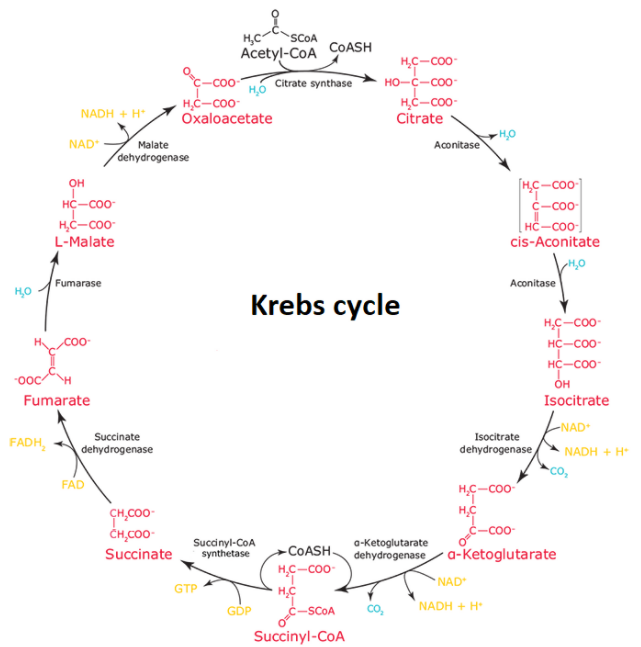
Which statement about Krebs cycle is correct?
i. The waste product of the Krebs cycle is oxygen
ii. Complete oxidation of food takes place. Krebs cycle involves step by step breakdown of pyruvic acid/lactic acid to produce ATP and $CO_2$.
iii. Electron carriers are produced by the Krebs cycle for the transportation of electron chains.
iv. None of the above
Answer
481.5k+ views
Hint: The citric acid cycle, commonly known as the Krebs cycle, is the second main stage in oxidative phosphorylation. Following glycolysis, the Krebs cycle transfers energy from these molecules to electron carriers, which are then utilised in the electron transport chain to generate the cell's energy currency. Site of Krebs cycle is the mitochondria of eukaryotes and the cytosol of prokaryotes.
Complete answer:
Let us solve this question by analyzing each and every option.
Option: i. Krebs cycle does not produce oxygen as a waste product instead it utilizes oxygen in its various reactions.
So, Option: i. is not correct.
Option: ii. In Krebs cycle complete oxidation of food occurs by a step by step sequential breakdown of pyruvic acid formed as a result of glycolysis. It yields NADH, FADH and GTP which are then converted to ATP in the electron transport chain. It also releases in this process.
So, Option: ii. is correct.
Option: iii. Electron carriers are not produced in the Krebs cycle.
So, Option: iii. is not correct.
Option: iv. None of the above
So, Option: iv. is also not correct.

Note:
The tricarboxylic acid (TCA) cycle, commonly known as the Krebs or citric acid cycle, is the primary source of energy for cells and is an essential component of aerobic respiration. The cycle converts the available chemical energy of acetyl coenzyme A (acetyl CoA) into nicotinamide adenine dinucleotide reducing power (NADH). It is a characteristic of aerobic organisms.
Complete answer:
Let us solve this question by analyzing each and every option.
Option: i. Krebs cycle does not produce oxygen as a waste product instead it utilizes oxygen in its various reactions.
So, Option: i. is not correct.
Option: ii. In Krebs cycle complete oxidation of food occurs by a step by step sequential breakdown of pyruvic acid formed as a result of glycolysis. It yields NADH, FADH and GTP which are then converted to ATP in the electron transport chain. It also releases in this process.
So, Option: ii. is correct.
Option: iii. Electron carriers are not produced in the Krebs cycle.
So, Option: iii. is not correct.
Option: iv. None of the above
So, Option: iv. is also not correct.

Note:
The tricarboxylic acid (TCA) cycle, commonly known as the Krebs or citric acid cycle, is the primary source of energy for cells and is an essential component of aerobic respiration. The cycle converts the available chemical energy of acetyl coenzyme A (acetyl CoA) into nicotinamide adenine dinucleotide reducing power (NADH). It is a characteristic of aerobic organisms.
Recently Updated Pages
Master Class 11 Computer Science: Engaging Questions & Answers for Success

Master Class 11 Business Studies: Engaging Questions & Answers for Success

Master Class 11 Economics: Engaging Questions & Answers for Success

Master Class 11 English: Engaging Questions & Answers for Success

Master Class 11 Maths: Engaging Questions & Answers for Success

Master Class 11 Biology: Engaging Questions & Answers for Success

Trending doubts
One Metric ton is equal to kg A 10000 B 1000 C 100 class 11 physics CBSE

There are 720 permutations of the digits 1 2 3 4 5 class 11 maths CBSE

Discuss the various forms of bacteria class 11 biology CBSE

Draw a diagram of a plant cell and label at least eight class 11 biology CBSE

State the laws of reflection of light

Explain zero factorial class 11 maths CBSE




